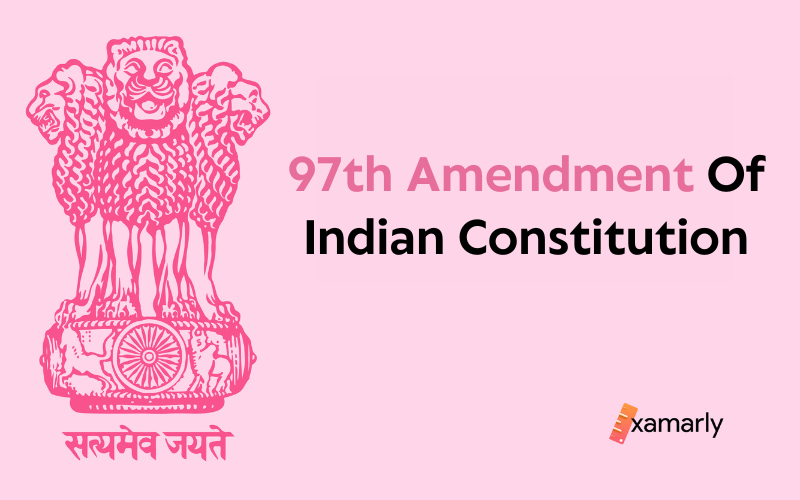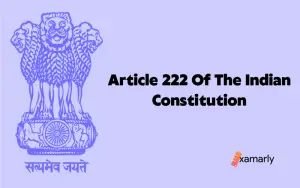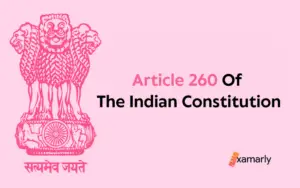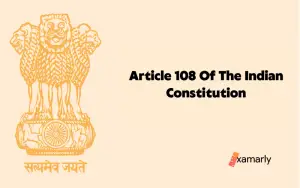The 97th Amendment of Indian Constitution is considered one of the major Amendments the Indian Constitution has seen.
It is concerned with granting a status of recognition and legal protection to the co-operative societies while also making efforts in resolving their issues by developing effective management techniques. The Act got enacted in 2011 has recently been in the news for violating the provisions held by Article 368(2).
This article will dive deeper into the Amendment and the reasons for its downfall while also gaining insights into its salient features and important provisions.
Background
The cooperative organizations have immense potential to assist the poorer sections of Indian society and guarantee fair economic growth.
The 97th Amendment Act was proposed to give legal rights and protection to cooperative societies since these play a significant part in the economy of India. The Amendment work towards improving efficiency and promoting Co-operative economic activities to help rural India progress.
- Cooperative society- Any organization that is registered or considered to be recognized under any co-operative society law currently in effect in any State is referred to as a “co-operative society.” These organizations are a part of a voluntary association of people with similar requirements who work together to advance a shared economic interest.
This also makes sure that the co-operative societies are functioning independently and in a democratic way and takes guarantees that the management will be held accountable to the members and other stakeholders.
The welfare of the co-operative societies was necessary since the cooperative sectors are majorly responsible for developing the socio-economic part of the Indian society and not giving them proper attention would mean hindering the progress of the country.
Also, to ensure that the elections, financial records examinations, and general body meetings are held on time and as per schedule, the amendment was necessary.
The 97th Amendment Act witnessed many changes in the Indian Constitution. Part III was added to Article 19(1)(c), and Article 43B was inserted into Part IV after Article 43A and the addition of Part IX-B to the Constitution.
However, the 97th Amendment of Indian constitution was recently in the news because of the disobedience to Article 368(2) of the Indian Constitution, which states that ratification is necessary in case of state issues.
Salient Features And Facts
- The 97th Amendment of Indian constitution was approved to regulate or systematize the co-operative society management and deal with the issues regarding the country’s co-operative societies’ effective management.
- The Act also aims to enhance the democratic functioning of the co-operative sectors without any political interference. The Amendment gives a status of fundamental rights to form co-operatives as per part III, Article 19(1)(c) thus balancing the co-operative laws across the nation.
- enabling state governments to demand periodic reports of activities and financial records of cooperative societies
- It also ensures that one seat for SC/ST and two seats for women are reserved on every cooperative society’s board.
- The co-operatives are permitted to set up agencies to make sure the elections are done properly.
- In addition, the Act promotes a unified legal framework while attempting to offer greater administrative independence and flexibility to sectors such as farming, credit, housing, and marketing industries.
- Apart from ensuring the independent functioning of the cooperative society, the 97th Amendment Act also states that the management will be held responsible to the members and stakeholders.
Date Enacted
The 97th Amendment Act was enacted in 2011.
Statement Of Objects And Reasons
Many Co-operative institutions’ management lacks professionalism, which has resulted in poor services and low output.
- The need for the 97th Amendment of Indian constitution was enacted to secure cooperative societies and improve their qualitative performances since they form a significant part of the country. The amendment was accepted in order to standardize cooperative society’s efficient management.
- The interests of the co-operative members were not being safeguarded and thus, to secure their interests and goals, the need arose for this Amendment to get implemented.
- Moreover, elections were occasionally been put off indefinitely, leaving nominated office bearers and administrators in command of these organizations for a protracted period.
- To assure these institutions’ contribution to the economic development of the nation, serve the interests of their constituents and the general public, and guarantee independent, democratic operation, and professional management, fundamental reforms were required.
- To carry out the required reforms, a suggestion to add a new section to the Constitution that could look into the necessary facets of Co-operative society operation, such as democratic, independent and professional functioning was given.
- The Seventh Schedule’s Entry 32 of the State List was acknowledged to cover “co-operative societies,” hence it was suggested in the Amendment to provide a framework for the Co-operative society operation, and state laws that adhere to the framework should control cooperatives.
Prominent People Involved
Rajendra N. Shah in the Gujarat High Court stated that the right to form cooperative societies is in the hands of the state and only the state legislature can pass the bill. However, in the 97th Amendment of Indian constitution, the bill was passed by the government without the ratification of the states, thus violating Article 368.
The Gujarat High Court provided the null and void status to the Amendment and then the case was challenged in Supreme Court.
Important Provisions In the 97th Amendment Of Indian Constitution
The 97th Amendment of the Indian Constitution introduced provisions to regulate the functioning of Co-operative Societies within a State.
The Act may also be referred Constitution (Ninety-Seventh Amendment) Act, 2011.
- The words “or co-operative societies” should be included following the words “or unions” in Part III of Article 19(1)(c).
- Addition of Article 43B to the Constitution. This article mainly deals with the development of Cooperative societies. It says that the state shall strive to promote the voluntary formation, democratic control, and professional management of cooperative societies.
This article was added to Part IV of the Indian Constitution after Article 43A. - Insertion of Part IXB entitled “The Co-operative societies” (Articles 243-ZH to 243-ZT) to the Constitution following Part IXA. These articles provide some explanations as to what exactly is Part IXB.
| ARTICLES | PURPOSE | |
| 1. | Article 243-ZH | Defines different terms associated with co-operative societies, namely multi-state co-operative society and state-level co-operative society. |
| 2. | Article 243-ZI | The provision of management, incorporation and ceasing of co-operative society is a matter of state legislature. |
| 3. | Article 243-ZJ | The co-operative societies cannot have more than 21 directors and all the elected office bearers and members have a fixed term of five years as of the date of the election in respect. Also, one seat for SC/ST and two seats for women are reserved on every cooperative society’s board. |
| 4. | Article 243-ZK | It ensures that a board election must take place before the end of the board’s term to ensure that the recently appointed board members take over immediately after the term of the outgoing board members expires. |
| 5. | Article 243-ZL | The board of directors of the Co-operative Society may be suspended or put on supersession for up to six months. |
| 6. | Article 243-ZM | The state legislature may include measures requiring cooperative societies to maintain accounts and have those accounts audited at least once every fiscal year. |
| 7. | Article 243-ZN | The Society’s General Body Meeting must be held within six months of the financial year’s end to do any business that may be specified under such legislation. |
| 8. | Article 243-ZO | The members of cooperative societies have all the right to access information. |
| 9. | Article 243-ZP | Every member of the cooperative society is likely to provide file returns to the authorized personnel within six months of the financial year’s end. |
| 10. | Article 243-ZQ | The provision to offer a penalty for any offence against the cooperative societies. |
| 11. | Article 243-ZR | Multi-State Cooperative Societies are subject to the provisions of Article 243ZR with the amendment that State Government, State Act, and State Legislature shall be interpreted as Parliament, Central Government, or State Act, as applicable. |
| 12. | Article 243-ZS | It makes provision for the Union territories and states that the references to the Legislature of a State in a Union territory with a Legislative Assembly refer to that Legislative Assembly and that references to the Administrator of that territory appointed under Article 239 in a Union territory without a Legislative Assembly refer to that Administrator. |
| 13. | Article 243-ZT | No matter what is stated in this Part, any provision of a law relating to cooperative societies that were in effect in a State before the Constitution (Ninety-seventh Amendment) Act of 2011 went into effect and conflicts with the provisions of this Part shall continue to be in effect until revised or revoked by a competent Legislature or any other authorized person or until the passing of one year after such commencement, whichever is shorter. |
Ratification
According to Article 368(2) of the Constitution, any amendments falling within the limits of Article 368(2), should be approved by at least half of the state legislatures since these deal with matters solely of a state.
However, this Constitutional amendment was passed without the ratification of the State legislatures. Hence, it faced many challenges in various courts and ultimately the Supreme Court decided the matter.
Court Judgement
In response to the PIL of 2012, Rajendra N. Shah v. Union of India, the Division Bench of Gujarat High Court stated that the 97th Amendment of Indian constitution has disobeyed Article 368(2) and hence should be declared as null-and-void. Also, this ratification did not take place, hence it was likely to be invalidated.
The case then went to Supreme Court to the bench of three judges.
The Supreme Court upheld the Gujarat High Court’s decision in Rajendra N. Shah v. Union of India to nullify some regulations of the 97th Amendment Act (Part IX B) relating to the efficient management of Co-operative societies, but it overturned the decision by inserting a provision pertaining to the Constitution and the operation of Co-operative societies.
According to SC, Given the federal primacy, the Constitution has been interpreted as quasi-federal with a tilt in favour of the federal government and the states. According to this principle, states have the sole authority to enact laws pertaining to the subjects that fall under their purview.
The three-judge bench with a 2:1 majority verdict ruled out that currently, only MultiState co-operative societies that conduct business inside of India’s several States and Union territories are covered by Part IXB of the Indian Constitution.
Recent developments in cooperatives
- The establishment of a separate Union Ministry of Cooperation was announced by the administration.
- It will offer a unique administrative, legal, and policy framework for enhancing the nation’s cooperative movement.
- A Co-operative based economic development model, in which each member works with a sense of responsibility, is highly significant in our nation.
Thus, the Ministry will seek to simplify procedures to make it easier for cooperatives to conduct business and to promote the growth of multi-state cooperatives (MSCS).
Summing Up
The 97th Amendment Act was proposed to overcome the difficulties faced by Cooperative societies and improve their performance and status in the country.
The extensive establishment of cooperatives was envisioned as one of the attempts to achieve social and economic justice and the equitable distribution of the advantages of progress.
According to this Amendment, these societies are given constitutional status and are legally protected while also maintaining their autonomous or democratic functioning.
The Constitution was amended to require that the states guarantee the autonomy of cooperatives, and as a result, state governments are now required to support the voluntary formation, autonomous decision-making, democratic control, and operation of cooperatives.
The Act witnessed many changes such as modification in Part III of Article 19(1)(c) with the insertion of the words “or co-operative societies”, and the addition of Article 43B (working towards enhancing the co-Operative Societies’ Voluntary formation, independent operation, and professional management) and Part IX B to the Indian Constitution.
However, the 97th Amendment faced challenges in the High Court of Gujarat as the Parliament didn’t ask for approval from the state legislatures before passing the bill. The ratification/approval is necessary for matters concerning states and since the cooperative societies are a part of the state legislature, ratification was required.
On July 20, 2021, the Supreme Court of India declared the 97th Amendment Act Unconstitutional. According to the Supreme Court ratification from states was necessary to pass the amendment which didn’t take place.
The Supreme Court also said that the responsibility of Multistate Co-Operative societies is of the Centre while that of the State co-operative societies is of the state. As of the current scenario, parts of the 97th Amendment on cooperatives are struck down.
Previous Post – 96th Amendment Of Indian Constitution
Up Next – 98th Amendment Of Indian Constitution
FAQ’s
What is the 97th Amendment Act?
The 97th Amendment Act secures the interest and rights of the cooperative and declares the formation of cooperatives as a fundamental right.
The amendment was accepted in order to standardize cooperative society management. It addressed issues with the efficient management of the country’s cooperative societies.
What changes are introduced in the 97th Amendment Act?
It modified Article 19(1)(c) in a way that after the words “or unions”, the words “or co-operative societies” should be inserted.
Article 43B was included in Part IV of the Constitution which encourages the Co-Operative Societies’ Voluntary formation, independent operation, and professional management. It also witnessed the insertion of Part IX B in the Constitution.
When was it enacted?
It was enacted in 2011.
Has it been cancelled?
It has not been completely removed. According to the Supreme Court’s three-judge bench, the matter regarding multistate Cooperative societies, the Constitution (97th Amendment) Act 2011 shall continue to be legal and in force.
What is a co-operative society?
Any organization that is registered or considered to be recognized under any co-operative society law currently in effect in any State is referred to as a “co-operative society.”
What is a Multi-state co-operative society?
A group of individuals whose objectives are not restricted to any one state and who are considered to be recognized under any current law in existence that governs such co-operatives are known as Multi-state Co-operative societies.
What is a State co-operative society?
In any law issued by the state legislature, a co-operative society whose region of operation encompasses the entire state is referred to as a “state-level co-operative society.






